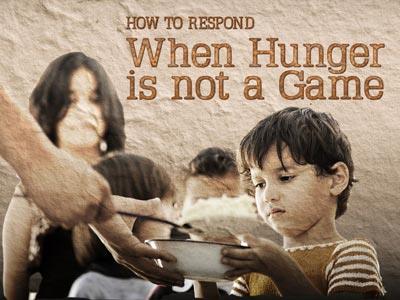-
A Healthy Appetite Series
Contributed by Alison Bucklin on Nov 24, 2022 (message contributor)
Summary: The proper response to mourning over the reality of suffering, and the key to meekness, is not conquering desire, but learning to desire the right things.
- 1
- 2
- 3
- 4
- Next
How many of you are planning to watch a football game today? How many of you are mourning the defeat of the Packers??? Anybody care about the fate of the Titans? Have you since switched your allegiance to the Rams or the Bengals? Now, who’s not going to watch anything? Who doesn’t much care one way or another?
By the end of the day, LA will be ecstatic and Cincinnati will be will be miserable – or Ohio will be ecstatic and California miserable. How long will it take you to get over the disappointment if your team loses? How often will you relive the excitement if your team wins? And yet nothing will have happened that actually matters, in the whole grand scheme of things. I mean, it’s only the Superbowl. Yes, really.
A lot of people - sociologists, psychologists - have speculated on what’s behind this human obsession with sports. Because it’s universal. Virtually every society in the world has some kind of ritualized play in which skills are exercised and winners are rewarded. The most widely accepted explanation is that sports sublimate our instinct for group aggression. It’s a form of tribalism. And tribalism is a way to elevate the self by belonging to a group that has more power - in this context, wins more games - than the other group.
Now in this context it’s relatively harmless, isn’t it. We don’t actively dehumanize or destroy the non-member, the outsider, the less-than-human... Although in recent years we’ve seen some post-game revelries turn into pitched battles with significant fatalities, from Peru to the UK, that’s the exception, rather than the rule.
But there is one aspect of competition that is so clear and so obvious that we don’t even think about it... and that is, we don’t think about the pain of the loser. We don’t empathize with them or care about them because, after all, “it’s only a game.” It is sanitized war. We get the pleasure of winning without having to deal with the moral burden of actually hurting someone.
Well, don’t let me guilt you for what is really a mostly innocent pleasure. But it really brings to the fore, doesn’t it, how large a part of our lives is eaten up by competition of one sort or another. And it also shows us that even relatively benign competition means winners and losers, and either giving or receiving pain.
One of interesting points about the second Beatitude, “blessed are those who mourn,” is that the Buddha concluded that life consists of suffering, that suffering is caused by loss, and therefore the only solution to suffering is to stop wanting anything so you won’t suffer when you lose it. Well, it certainly works at the sports level. I assure you that I am not going to suffer today no matter who wins, the Bengals or the Rams. I have managed to conquer desire - in that one arena.
But it’s no virtue to give up something you don’t care about. The real test is to let go of something you DO care about. Buddha’s followers spend a great deal of time and effort disciplining themselves to not want anything - to become completely detached. In effect, they are trying to squash, by their own efforts, a very strong and central part of what it means to be a human being. Some succeed. But that’s not the Biblical way of dealing with it. Because becoming completely detached means, in essence, to stop caring. To stop loving. And that does help relieve suffering, but only at the cost of numbing – deadening - your soul. As Alfred Lord Tennyson said, “Tis better to have loved and lost than never to have loved at all.” Think of it this way: The way to avoid being disappointed at the end of today’s game is not to watch it to begin with. And if that means giving up SuperBowl parties as well, OK, that’s part of the package.
Last week we were looking at what it means to be meek. We learned that meekness is not the same thing as weakness. To be meek in the Biblical sense is not to squash yourself into a doormat, but to surrender your strengths to God so that he can use them for his purposes.
So how do we put these two concepts together, the reality of suffering and God’s call for meekness, and what does it have to do with sports?
Well, competition involves wanting to prove yourself better than someone else, and that leads to loss, that is, suffering for someone. The stronger you are the likelier it is that you will be the winner, and the pain of loss will be borne by someone else. And at the same time the stronger you are, the more useful you will be to God - IF you surrender yourself. It’s not a matter of conquering desire - but of allowing God through the Holy Spirit to turn your desires into harmony with his.

 Sermon Central
Sermon Central



